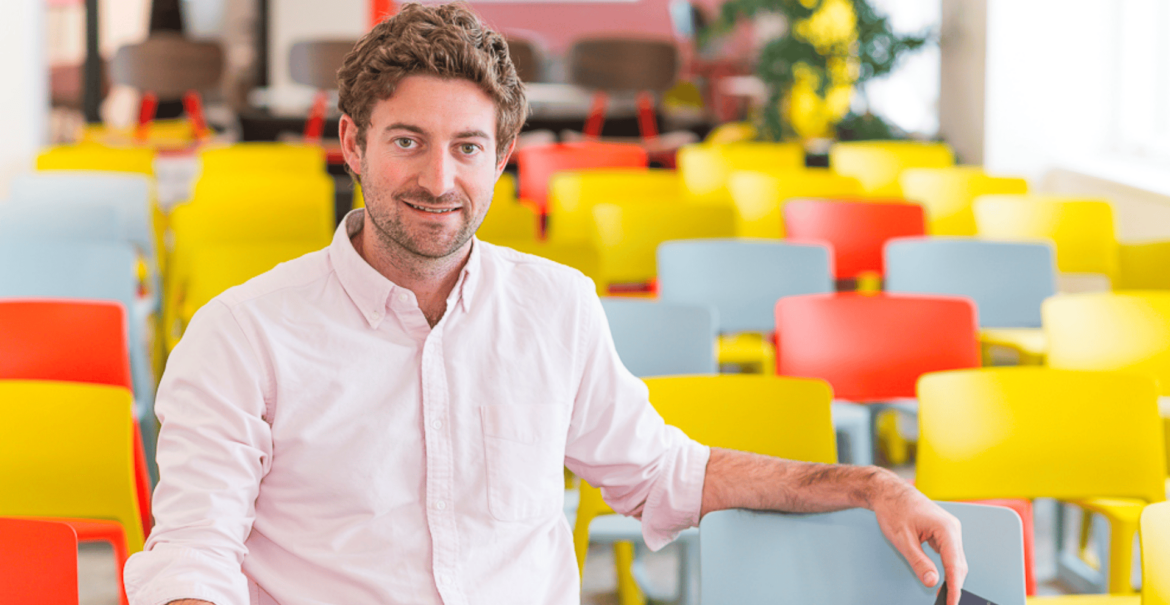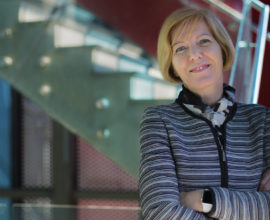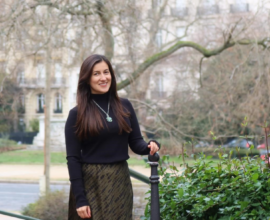Mathieu Aguesse
Exploring possibilities
![]() Reading Time: 9 minutes
Reading Time: 9 minutes
CEO Schoolab San Francisco
Mathieu Aguesse is a 2015 graduate of ICAM School of engineering and Audencia’s specialised master in Marketing, Design and Creation (MS MDC). From his offices in San Francisco, he runs the US version of Schoolab, an innovation studio that trains, advises and supports its clients in responsible innovation. Mathieu also teaches design fiction and ethical and collaborative innovation at UC Berkeley. ‘Deplastify the Planet’ is one of his flagship programmes.
Mathieu’s story is that of a boy with a passport full of stamps, who, from South Africa to Nigeria, has developed a taste for travel, discovery and relationships, which he carries with him everywhere he goes.
Our conversation takes place across an ocean and several time zones and we pick up the thread of our discussion that started two months earlier.
When asked if he is in San Francisco for the duration, he smiles as if the binary format of the question still puzzles him. For Mathieu, “Staying in the USA or returning to France” is an incongruous choice as the world is full of so many other possibilities too. Mathieu is giving himself time to choose but also time to welcome his third child in the coming days.
Mathieu sees life as a permanent and collaborative learning process in which everything always ends up making sense and aligning when you know how to listen and observe. Discreet and curious, Mathieu doesn't like to talk much about himself: he prefers to talk about his encounters, discoveries and projects. In short, anything that will enhance his perception of the world he lives in with eyes and ears wide open.
Tell us where your wanderlust comes from
I grew up in Africa, between South Africa where I arrived two weeks after my birth and Nigeria. My parents were diplomats, attached to the Ministry of Foreign Affairs. They moved around a lot and I guess they passed on to me their thirst for curiosity, discovery and meeting people.
My family returned to France when I was 12 and then, when I was 16, my parents headed abroad again without me. In most families, it’s the children who leave the nest, in mine it’s the other way round. That changes your perspective on life.
So an international career was always on the cards…
Subconsciously, yes.
Between my return from Nigeria and my studies at ICAM and Audencia, I spent ten years in Nantes. Even though I loved my time there, I felt a bit stifled. Deep down, I knew I needed to go further afield.
I have visited about sixty countries in my life, so living outside France was never a case of if but when. I had been ready for a long time when the opportunity arose; I would even say that I’d been waiting for it to happen. Sometimes life creates beautiful coincidences: when I left for San Francisco, my first child was the same age I was when my parents took me to South Africa.
In fact, I would have liked to start Schoolab in South Africa to bring an innovation model to which I’d had access to a country that, in my opinion, represents the future of the world. However, for a company like Schoolab, it made sense to start our international development in Silicon Valley, the most dynamic and powerful entrepreneurial ecosystem in the world. It was a big gamble for us to see if we could exist in San Francisco with our values and differentiation, the ethical side of innovation.
So even though it wasn’t Africa, I seized the opportunity without question and with enthusiasm.
At the beginning, however, your path didn’t look like that of an entrepreneur in Silicon Valley.
I had already sown seeds and they were just waiting to germinate and grow. At ICAM, I had taken part in an entrepreneurship competition around the digitalisation of AMAPs , a very rich experience even if it didn’t go all the way.
However, thanks to the alumni network, after graduating I made a “safe” choice by joining the construction sector, perhaps because I had not yet become aware of my true needs and values: discovery and ethics. Very quickly, however, this conflict of values blew up in my face: I was uncomfortable with the male-dominated environment where the balance of power was profoundly unequal to the detriment of the artisans, the “small guys”. This did not suit me at all and I wanted out.
I wanted to do something radically different and headed to the luxury sector, where, on the contrary, artisanship is a highly valued cornerstone of the industry. However, it’s a difficult environment to get into and no-one wanted to hire me. The result was that, with a partner, I created a start-up for bespoke leather goods.
We had a promising concept, good suppliers and funds raised from the BPI. Unfortunately, like so many start-ups, the ride was not a smooth one. Our project was used as a case study in the HEC Entrepreneurs course and integrating the conclusions proved hugely complicated. Instead of being strengthened, our confidence, in ourselves, our project and each other, was put to the test. What bound us together at the beginning then seemed to divide us, so we decided to stop.
Was abandoning your start-up the hardest choice you ever made?
There’s no doubt that the decision was a tough one at the time, but I also knew that we couldn’t continue as we were and that our chances of success would be compromised if we couldn’t align our visions. Strictly speaking, it wasn’t so much a choice as a necessary step that had to be accepted and digested.
The decision I had to make directly afterwards proved to be more difficult.
What was that?
After ending my start-up adventure, I received a very nice job offer from a fabulous brand of leather goods. It was the kind of offer that I couldn’t refuse and that would allow me to achieve my dream of working in the luxury sector.
I was very excited and happy about the offer, but deep down I had a feeling that I was missing a few strings to my bow, especially in design. This was a thought that had been floating around since creating my start-up and I’d started investigating solutions, including returning to the classroom.
Then I received two acceptance letters on the same day: one from my dream employer and one from the MDC recruitment team at Audencia. I ummed and aahed but chose Audencia. This led to some interesting conversations with my parents who, although they didn’t really get the no-brainer of paying to go back to school instead of accepting a well-paid opportunity, were always supportive.
It was a choice of intuition over reason and I don’t regret it.
So that’s how you joined Audencia?
Yes, for the specialised master in Marketing, Design and Creation, but also for the programme director, Nicolas Minvielle, whom I had met and asked a billion questions about the course, the school, future prospects and more. The role and practices of designers fascinated me.
After my baccalaureate, I had considered studying at the School of Design in Nantes, so I was already gravitating towards that environment: the little seeds I was talking about earlier were planted but I didn’t want to water them too soon, probably for fear of the lack of opportunities but also perhaps because I was too young. At 18, I think I was too young to have been exposed to the realities of life and to be able to make enlightened decisions. I guess my first degree was a precautionary choice, perhaps also by default.
On the other hand, joining the MS MDC programme was a very well thought-out choice, and paying for the course myself, instead of earning a good living elsewhere, gave an extra dimension to the challenge. I knew I had to make the most of the experience.
Looking back, I think that it is very difficult today to do this type of course without a bit of experience under your belt. That’s why I always involve companies in my teaching at Berkeley, so that the students are immediately faced with the realities of systems and organisations. I also believe that my mission as a professor is to accompany students on this path of continuous learning and teaching them how to learn, i.e., giving them the tools to challenge the status quo and think for themselves.

What memories do you have of Audencia?
I’m sure my background has made my memories quite different from those of the rest of the class. Even though I wasn’t yet 30, I’d already experienced entrepreneurship, business and working in the real world.
I think the French education system should value courses like the MDC and Specialised Masters in general. These courses are goldmines that can be an enormous lever for transformation. We should be making so many more bridges between education and work, to allow more people to come back to study at 25, 35 or 45.
When I arrived at Audencia, I quickly realised that entrepreneurs and designers are made of the same stuff! They think with their guts and with their emotions. That’s how you can recognise them: there’s a rather interesting form of collective hysteria in the MDC classroom because the course is creative and gets people moving. The profiles are very (very) hybrid and able to juggle subjects and disciplines. This suited me well because I like the idea of not being confined to a specific box.
Is being unconfined your career secret?
Maybe it is! I think I’ve always regretted my default choices more than the risks I took that didn’t pay off.
Today I see things differently: I accept what life throws at me and then I observe and try to understand the systems in which we evolve and endeavour to remain proactive in order to align these systems with my desires – or the opposite.
For example, in four years in San Francisco, we never bought a car, which is very uncommon here. However, on countless occasions, our friends and acquaintances offered to lend us their cars, vans and even houses. Simply because we didn’t rush into anything, knew how to align our desires with the needs and capacities of our close ecosystem at the right time. The same thing happened to us when we were looking for a house: instead of rushing to make an appointment with a real estate agency, we talked about our search within our circle and went to meet the people we were introduced to. We listened and were open and very quickly found a great place.
It’s the same professionally: you have to be patient and know how to seize opportunities when they arise. To do this, you need two essential qualities: knowing how to conceptualise and express what you do or want, so that you can easily talk about it around you, and knowing how to give back whenever you can, in one form or another.
Is sharing the key to today’s world?
Perhaps more globally, awareness but also permanent transformation. I give this impetus to Schoolab, activating transitions with a rationale of continuous, controlled and flexible, proactive and positive movement.
The people I joined Schoolab with have all left. I stayed. Why did I stay? Because I managed to develop my job and my professional practices, and therefore my impact on the world around me. I regenerated the meaning I gave to my projects throughout my time in the company.
This is what I try to teach my students and the companies I work with. I share my own experiences to help them adopt a positive and sustainable approach to transition. Individuals who start to change will continue changing and, through a form of osmosis, this will continue to have an impact on their activities.
Change is an attitude that feeds on learning, observation and freedom of choice. In order to take power and act on what we want to transform, we must understand the world, not just submit to it. You have to develop critical thinking, which means challenging different points of view. I try to put this into practice in my courses, by inviting pro-plastic lobbyists to my ‘Deplastify the Planet’ programme, for example. We all need to find some depth of thought and reinvest in freedom of choice.

How do you see the future?
That’s a difficult question!
Today, everything is going well professionally. I have just received an award for best teacher at Berkeley. Schoolab is growing, even though we are focusing on slow, organic and qualitative growth rather than scale. By the end of the year there should be ten of us, compared to only two during the COVID-19 period and our programmes are very successful. I have just published an article on Design Fiction in the prestigious Harvard Business Review. However, the future is not just about that. I have two children, and soon three. In ten or even twenty years from now, I want to be able to look them in the eye with pride. Not for my professional success, but for having understood the issues of our time and being part of the solution.
Having children puts things in an interesting time scale and gives depth to my daily action. For me, defining a company’s vision means making sure that the activities to which I devote most of my time contribute to creating a positive impact on the world we will inhabit tomorrow.
I often say, “You can’t go wrong with sustainability.” In fact, you can go wrong, but in the method not the commitment. I am very interested in regenerative agriculture: we are involved in maintaining the community garden and beehive, which I find fascinating. When you look closely at bees, you understand both the way honey is made and the concept of social inequality. You think about healthy eating and climate justice.
When I look back, I have no regrets: I made mistakes, I made choices by default, but I learned. I understood that freedom of choice was the condition for the future, the key to true success, the one that lets you think you are in the right place, at the right time, with the right people and the right impact.


